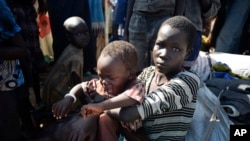Negotiators for President Salva Kiir’s government and the armed opposition group led by Riek Machar emerged from days of meetings Wednesday with news that the people of South Sudan did not want to hear: disagreements are still barring the way to peace.
The two sides had spent two days cloistered in a room in Addis Ababa for closed-door bilateral talks, but still had a laundry list of issues they do not concur on, government spokesman Michael Makuei said.
"We have disagreed on the structure of the government. We have disagreed on the powers and competencies of the president, and the vice president, or the first vice president, as the rebels call it. We have disagreed on the power-sharing percentages, whether at the national level or the state level. We have disagreed on security issues, on the demilitarization of Juba and other places," Makuei said.
Makuei said there cannot be a peace deal unless the two sides reach a compromise on the outstanding issues.
The chief negotiator for the Machar's SPLM-in-Opposition (SPLM-IO), Taban Deng Gai, said while his side made concessions on several issues, the government delegation failed to budge and brought nothing new to the table.
Deng called on President Kiir's government to soften its position on areas of discord so that a final deal can be reached by the Monday deadline, which was set weeks ago by the IGAD-Plus mediation team.
Kiir, Machar expected Thursday
Lead mediator Seyoum Mesfin said Mr. Kiir and Machar were expected in Addis Ababa on Thursday, and having them at the talks could spur the two sides to find a way around their differences. The Ethiopian diplomat said on national television that he is still hopeful that a deal will be signed on Monday.
But a security analyst for IGAD and the African Union said signing a deal is the easy part. Implementing any deal that is signed will prove difficult, Mehari Taddele Maru said.
The IGAD-Plus mediation team "will have to think about, if there is agreement, how the implementation will go. I'm talking about the warring parties being able to command loyalty and commitment from their followers to implement this," Mehari said.
The two of them are symbols of hatred and division. Salva Kiir and Riek Machar cannot lead the transitional government.Gathoth Gatkuoth, former SPLM-in-Opposition general
Mehari said both the government and rebel sides are likely to face opposition from within their ranks to whatever agreement is signed. In particular, he said, incumbent Vice President James Wani Igga and his backers are likely to rail against the part of a compromise agreement proposed by IGAD that names Wani Igga as second vice president -- below Machar.
Generals split from rebel group
Mehari also warned that there could be fractures in the armed opposition over a peace deal. Almost as soon as he spoke, two rebel generals issued a statement, announcing they have split from the SPLM-IO and are setting up their own movement.
One of the two generals, Gathoth Gatkuoth, told South Sudan in Focus that the new group's political wing will be called the Federal Democratic Party, and the armed forces associated with it will be called the South Sudan National Army.
Gatkuoth said the group's main gripe is with President Kiir and Machar.
"The two of them are symbols of hatred and division. Salva Kiir and Riek Machar cannot lead the transitional government," Gatkuoth said in a phone interview.
"There's nothing wrong with peace, but the problem is the leadership of the transitional government of national unity based on President Kiir and Riek Machar. That agreement of Addis Ababa is an agreement that will only secure the positions of Riek Machar and President Kiir."
"The better way for peace to come is for the two of them to step aside," he said.






